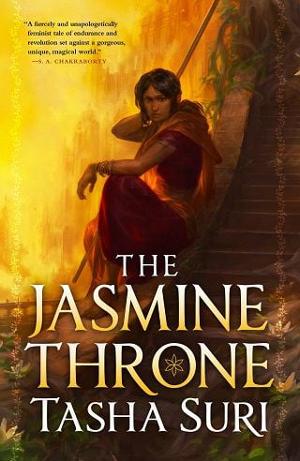Chapter 51: Rao
RAO
The lacquer gardens of Srugna were an interlocking maze of monasteries. Rao walked through them, barely seeing anything around him. Priests had gathered. There were lords of Dwarali in high-necked robes, bows at their backs; Srugani, lances in hand; Saketans with their steel whips wound at their waists; his own Alorans, blue-turbaned with bands of daggers wound at the hip and steel chakrams at their wrists, and even Parijati, clothed in light weaves with sabers and prayer stones to mark their status. There were enough disparate lords and nobles to fill the monastery steps nearly entirely.
A man walked down the steps on the path left between them. He wore a dhoti and a shawl of pale blue, his chest bare and his hair bound back in a long braid. Even before he raised his head, even before his mouth shaped a smile, Rao recognized him.
“Emperor Aditya.” Rao kneeled. Behind him he heard Prem’s men—his men—kneel down too, a chorus of creaking leather and armor. “We’ve come.”
“Rao.” Aditya’s voice was gentle. “I’m not emperor.”
“Not yet,” said the Dwarali lord, from the edge of the steps. “But you will be. We’ve come to see to that.”
Aditya crossed the ground. Beneath his bare feet the green leaves crumpled noiselessly. The birds sang. He held his hand out to Rao, who took it. When Rao stood, he found himself drawn into a fierce hug, Aditya’s cheek pressed to his own.
“Rao,” said Aditya, drawing back, eyes bright. “Ah, I’ve missed you. Why have you taken so long to come?”
“Malini,” Rao managed to say.
“You have her with you?” Aditya asked. There was such hope in his eyes.
Rao shook his head, and the hope dimmed.
“Come then,” said Aditya. “And we’ll speak of what has passed.”
They settled into what could only be Aditya’s own room. It was neat and plain, entirely a priest’s chamber, with a charpoy for sleeping, and a box of books, carefully sealed to keep out heat and damp. There were no candles. The only light, at night, would come in through the vast window, which opened to a garden of lacquer and of green. Golden songbirds flitted from branch to branch, trilling brightly.
“I am glad you tried to save her,” Aditya said, once Rao had stumbled through the business of explaining what had passed. “And—I am sorry for your loss.”
Rao swallowed. If he spoke too soon, he was afraid he would begin to weep. His grief lay on him like heavy hands. But he couldn’t allow it to hold him.
“Yes,” Rao managed. “Prem. He was.” His lazy grin. The ever-present wreath of smoke from his pipe. Those shrewd eyes, and the sheer kindness of him, always folded around the shape of a joke, a laugh, a drink. What was Rao meant to do without him? He shut his eyes. One heartbeat, that was all he took, to breathe through the sorrow that rolled over him. “He was your friend once, too, Aditya.”
Aditya nodded. “One of his cousins is here—Lord Narayan. He will need to be told.”
“It will be done.” He studied his friend, worry pushing aside grief for the moment. “Are you—well? You seem unlike yourself.”
“I’m sorry,” said Aditya then. And there was real sorrow in his voice, at least. Now that they were alone, no longer before the Saketans and Dwarali, the Srugani and lords of Parijat, his shoulders had bowed. The calm of his face had faded. “I’m not the friend you once knew, I’m afraid. And not the would-be emperor these men require. I told them… ah.” He touched his fingertips to his forehead, as if trying to smooth away an invisible pain. “I told them I awaited a sign from my god. Releasing me to the task of war.”
“And they’ve stayed?”
Aditya’s smile was tight. “No man of faith, whatever he may worship, willingly perverts the will of a god.”
Rao thought of Prem, rotting, blooming, blaming Chandra’s perversion of the faith of the mothers of flame for the sickness that had fallen over him and his people.
“And will you wait for our god to speak, Aditya? Because these men will not remain forever, and Chandra must be removed.”
“If they want Chandra deposed, they will wait.”
He was right. Parijatdvipa was born because of the sacrifice of the mothers of flame, and flourished under the unifying rule of their descendants. The Age of Flowers was such a strong cultural memory in all of them—a faith that went beyond gods or spirits—that replacing the imperial bloodline that held them together, like a thread through frayed cloth, felt anathema.
If they wanted Chandra gone, they needed Aditya. There was no one else.
“Must he truly be deposed?” Aditya said, suddenly, as if reading Rao’s thoughts.
“Yes,” said Rao, just as swift. “My father has joined this cause. My sister died for it. Your own sister is imprisoned or dead also, for the sake of removing him from the throne. And Prem…” Rao stopped. “Yes. Chandra must be removed. You know it, no matter how priestly you may be now.”
All the imperial siblings had the same eyes, Rao thought, as Aditya looked at him—deep and dark, with a gaze that could pin a body and hold it, by sheer force of charisma alone.
“Will you tell me your name, Rao? Your true name?”
“As a priest of the nameless, you should know better than to ask me that.”
“I don’t ask you as a priest,” Aditya’s said quietly. “I ask you as your friend.”
“No,” said Rao. “You ask me as the prince named emperor. You ask me because you gained a revelation when you entered the garden of the nameless all those years ago with—with me. I expect you’ve had many other revelations since, as a priest. But still, the picture is incomplete, isn’t it? The future is a shadow thrown by a great beast, or light seen through shifting water. You just need a little more. A clue, a word, and you’ll be sure that what you think is to come is true.” Rao swallowed, and looked away, out at the gardens. He saw blue birds. Gold. “The whole of fate isn’t for mortals like us. So no, I won’t tell you my name. It isn’t for you.”
“One would think you were the priest, not I,” Aditya said mildly.
“I’ve been a faithful of the nameless far longer than you’ve been a devotee, Aditya.”
Aditya had never been quick to anger, and that hadn’t changed. He inclined his head wordlessly. The only sign that he was at all perturbed or wounded was a slight thinness to his mouth.
“Come,” he said. “I have a vision to show you. Something the nameless god revealed to me.”
Aditya led the way to a quiet segment of the garden, surrounded by a protective wall of spindly lacquered trees laden with heavy red leaves. At its center stood a pool of water upon a plinth.
“We feed it with water drawn from the reservoir that lies beneath the gardens.” He gestured at the channels on the ground. Walked over to the plinth. “Do you remember,” Aditya continued, “the night you took me to the gardens in Parijat?”
Of course Rao did. “We were drunk,” he said. “If we’d been sober I never would have taken you.”
But they had been drinking, and Aditya had been asking about his name again, in that way he always did: insistently, steadily, but charming, a grin on his mouth.
“You don’t tell a prophecy just like that,” Rao had said with a grin of his own. “No matter what it is. You know, my great-aunt’s name was a prophecy three pages long? And all about how fields would be irrigated in fifteen years, in eastern Alor.”
“Truly?”
Rao had nodded. “Well, at least she made the farmers very happy. Increased our crop yield.”
“And what will your name change, Rao?”
Rao had shaken his head, a queasy feeling in his stomach that wasn’t from the drink alone.
“If you’re so interested in the faith of the nameless,” Rao had replied, not knowing what his words would result in, “then get up—leave your wine—and I’ll show you the future.”
They had entered the gardens of the nameless, laughing and stumbling, and found themselves at a plinth just like the one before them now.
Now, Aditya took the role that Rao had taken so long ago. He placed his hands on the edges of the basin in quiet reverence. He traced the edges. Back. Forth. Began to murmur a prayer in archaic Aloran.
Rao steeled himself—approached the plinth—and mirrored Aditya’s stance. Lowered his head to stare at the water.
Around them the leaves of lacquer clicked and rustled, and then fell eerily silent.
When you commune with the nameless—when a priest or a drunken Aloran prince lays hands on a seeing basin and sings the ancient prayer—you seek the voice of the universe.
There was a door in the water. A door in his mind. Rao looked once at Aditya, then walked through it.
There is a void that holds the world.
Some countries, some peoples, some faiths think it resembles water or rivers. But Rao knew better. As a boy, before he’d been fostered to Parijat, he’d been taught by the family priest, in the garden of the nameless that bordered the Aloran royal mahal.
Before there was life, there was the void. And in the void—in its lightless unknowability—lay the truth of the nameless god.
He gazed into it now. Hung in its black nothing and waited as the voice of the nameless unfurled around him, opening like stars.
He saw the voice of the nameless and heard it ring in his ears. A mask—a mask of wood. A mask that was a face of flesh and jasmine and needle-flower, bright marigolds and heady sweet roses. A face on a body crawling free from waters deep and strange. He heard the nameless’s voice.
A coming. An inevitable coming.
He saw flowers wither in fire. Saw a pyre. The screams of women. His sister’s voice.
A coming, a coming. They come in water, they come in fire. They come.
This sliver—this fragment of Aditya’s own visions—speared through him.
They returned to the garden. Returned to themselves.
Their shared breathing was hoarse and unsteady, but Aditya found his equilibrium first.
Aditya’s expression was otherworldly, his eyes entirely black. He blinked, and blinked once again, and they returned to their normal dark gray. But the gift of the nameless was still in his voice when he spoke: the sure knowledge of what was preordained.
“There is a sickness coming to Parijatdvipa. There is a sickness coming to every land, imperial or not, a sentience rising that will destroy everything that matters to us. That is what I saw when you took me to the prayer gardens and the nameless spoke to me. If I had been named by prophecy at birth it would have been like this: ‘You will see them come, and in the nameless god’s eye, you will see the way to make them go.’” Aditya’s expression was tortured. “Now you have seen them, you know why I put aside the throne. Why I seek the way to understand what the nameless promised me.”
Rao did. The vision was so overwhelming that he reeled from it. The earth turned monstrous. The body turned monstrous. He thought of Prem, dead, with marigold petals seeping from his eyes.
“What are they?” Rao asked, choked.
“That I don’t know,” Aditya said somberly.
The way of priests was isolation and meditation—a surrender to fate. The opposite of kingship, where a man inevitably held the fate of swathes of people in his grasp.
“Then why agree with Malini? Why allow this rebellion at all?”
“The nameless gives me no answers,” said Aditya. “And in the silence of the nameless, my sister speaks. We’re told to trust fate, Rao. I wonder—I wonder if allowing the force of my sister’s will and belief to carry me is what the nameless wants from me. Or if… if her dream leads me astray from the truth. So I let men surround me, and name me emperor, and hope the answer will come.
“And of course, I miss myself,” Aditya added, in a voice so quiet it sounded like the confession it was. “I miss my old fate and my purpose. And for all that Parijatdvipa—the throne, the crown, the empire, all of it—is insignificant in comparison to the dangers that threaten this world, I miss my old life still.” Aditya released the basin. Moved away from it, to stand by Rao instead.
“The throne of Parijatdvipa—rule over my father and his land, and all the lands of the empire—is not a small thing,” Rao replied.
“I know you believe so. Part of me continues to also, despite the truth. You must see now,” Aditya murmured, “why I seek your name? Perhaps no mortal man deserves a complete image of fate. Perhaps no man can comprehend such a thing. But I have two great purposes tearing me in two. I need guidance. And when you’ve come so far to serve in this war, come with a name that is a prophecy—I have to ask. And hope you’re my answer.”
“I can’t speak it,” Rao said sadly. “Not yet.”
“And yet it concerns me, doesn’t it?” When Rao said nothing in response, Aditya exhaled and nodded. “I only wish you would tell me, so that I would know what to do.”
“That isn’t how it works,” Rao said. “You know it isn’t. And… Aditya. I.” He stopped. “I’m not a man who gets angry easily,” said Rao. “But what Chandra did to your sister, and mine, and Lady Narina, the way he mocked faith to burn them…” Rao grappled for calm, gazing fixedly at the neat lines of Aditya’s priestly shawl. “He was always cruel, Aditya. Cruel and vindictive. But I don’t need to be a priest of the nameless to see that this is only the start of what he can do, and will do, now that he has a measure of power. And if you cannot see that—if you cannot see that you must put him aside—then you are indeed not the friend I once knew. Whatever vision the nameless granted you when I took you to the gardens—the answer to what you need to do is plain.”
Aditya flinched as if he’d been struck. Rao ran a hand over his own face. “I—need to rest,” he said raggedly. “Aditya. About your sister…”
“I have men, watching the seeker’s path,” said Aditya. “Watching for lights, or strangers. If Malini comes, we’ll know of it. I promise you.”
“She was trapped in Hiranaprastha. On the Hirana,” said Rao roughly. “Dead, perhaps.”
“Ah, Rao.” Aditya sounded pitying. “We both know she isn’t dead. Now rest. You’ve had a terrible journey.”
We do not know, thought Rao, his thoughts sharpened by a hysterical edge of fury and despair. We do not.
But I do.
 Fullepub
Fullepub 



